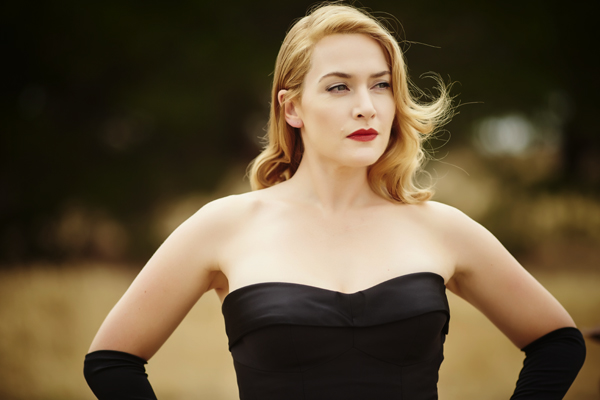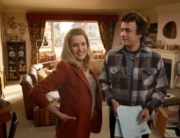In a dusty, desolate corner of the world (also known as the far reaches of Australia) in the 1950s, a soigné woman alights from a bus, the only passenger to disembark. Her appearance is at odds with the surroundings. Every hair is in place, she’s wearing a picture hat in the middle of nowhere, her dress is perfect. She hefts her luggage, including her trusty Singer sewing machine, lights a cigarette, and announces, “I’m back, you bastards.” This great opening line tells you as much about her—Tilly (née Myrtle) Dunnage, the town pariah and an actual bastard—as it does the townspeople of Dungatar, who banished her when she was a schoolgirl.
Now that she’s all grown up, Tilly (Kate Winslet) is back for answers and revenge. Is she really responsible for the death of a bullying schoolmate 25 years ago? Is she cursed? Who is responsible for her exile? But before she can address those questions, she has to deal with her mother, “Mad Molly” Dunnage, played with scene-stealing gusto by Judy Davis. Molly is holed up in her shack on a hill above Dungatar, her only companion a wild possum. She doesn’t recognize her daughter, and she puts up quite a fight when Tilly moves in and begins to clean up the place.
The scenes between mother and daughter are hilarious, with the unkempt, scruffy Davis providing the perfect foil to Winslet’s impeccable, implacable glamour. The two have even more fun when handsome hunky neighbor Teddy McSwiney (Liam Hemsworth) enters the story. Teddy pursues Tilly; Molly ogles Teddy and inserts herself in their budding courtship. A scene where mother and daughter are measuring a shirtless Teddy for a suit is played for laughs but reveals a depth to each character.
After Tilly disrupts a rugby game wearing a stunning red ensemble, the women of Dungatar begin to clamor for her couture creations. She transforms them, but only on the surface. Soon enough they’re back to their old snobbish and spiteful ways, plotting against her and hiring a new seamstress to outfit them for their town play. Aussie director Joyce Moorhouse and her husband, P.J. Hogan, adapted the screenplay from Rosalie Ham’s novel and do an admirable job of paring down the story without losing the bitter flavor of the 2000 best seller.
Costume designers Marion Boyce and Margot Wilson skillfully and efficiently convey the women’s (and cross-dressing police chief Hugo Weaving’s) personalities in their new wardrobe. The entire design team deserves praise: you’ll feel the Dungatar dust and desperation in Roger Ford’s stark, washed-out production design (art direction by Lucinda Thomson, set decoration by Lisa Thompson), with its almost two-dimensional housefronts and spiny, leafless trees. The acting, even in the less fleshed-out roles, is superb. Standouts include Sarah Snook as Tilly’s first swan, Weaving as an initially ambivalent character who redeems himself, and, of course, Davis, who shines, despite being the only woman who is not dressed to the nines.
The film, like the book, changes tone near the end and gets dark indeed, but even the closing acts contain some humor, albeit pitch-black. Some commentators have criticized the age gap between Hemsworth and Winslet, but this reviewer found that a welcome change from the usual Hollywood male-to-female discrepancy. Winslet is so winning you won’t notice it after a few minutes anyway. With Tim Burton–esque moments, closing scenes reminiscent of Brian De Palma’s Carrie (but funnier), and outsider characters that wouldn’t be out of place in a John Waters film or What’s Eating Gilbert Grape, this is a rollicking revenge flick wrapped in couture.

















Leave A Comment